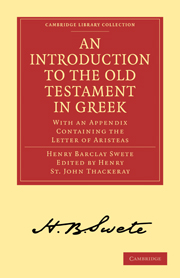Book contents
- Frontmatter
- PREFACE
- Contents
- PART I THE HISTORY OF THE GREEK OLD TESTAMENT AND OF ITS TRANSMISSION
- PART II THE CONTENTS OF THE ALEXANDRIAN OLD TESTAMENT
- CHAPTER I Titles, Grouping, Number, and Order of the Books
- CHAPTER II Books of the Hebrew Canon
- CHAPTER III Books not included in the Hebrew Canon
- CHAPTER IV The Greek of the Septuagint
- CHAPTER V The Septuagint as a Version
- CHAPTER VI Text divisions: Stichi, Chapters, Lections, Catenae, &c
- PART III LITERARY USE, VALUE, AND TEXTUAL CONDITION OF THE GREEK OLD TESTAMENT
- APPENDIX: THE LETTER OF PSEUDO-ARISTEAS
- INDICES
CHAPTER IV - The Greek of the Septuagint
Published online by Cambridge University Press: 05 August 2011
- Frontmatter
- PREFACE
- Contents
- PART I THE HISTORY OF THE GREEK OLD TESTAMENT AND OF ITS TRANSMISSION
- PART II THE CONTENTS OF THE ALEXANDRIAN OLD TESTAMENT
- CHAPTER I Titles, Grouping, Number, and Order of the Books
- CHAPTER II Books of the Hebrew Canon
- CHAPTER III Books not included in the Hebrew Canon
- CHAPTER IV The Greek of the Septuagint
- CHAPTER V The Septuagint as a Version
- CHAPTER VI Text divisions: Stichi, Chapters, Lections, Catenae, &c
- PART III LITERARY USE, VALUE, AND TEXTUAL CONDITION OF THE GREEK OLD TESTAMENT
- APPENDIX: THE LETTER OF PSEUDO-ARISTEAS
- INDICES
Summary
1. No thorough treatment of the Greek idiom of the LXX. is known to exist. Two ancient treatises upon the dialect of Alexandria, by Irenaeus (Minutius Pacatus) and Demetrius Ixion, have unhappily disappeared. In modern times the ground has been broken by Sturz and Thiersch, and within the last few years Deissmann has used the recently discovered papyri of Egypt to illustrate the connotation or the form of a number of Septuagint nouns and verbs. Much has also been done by Dr H. A. A. Kennedy and the Abbé J. Viteau in the way of determining the relation of Septuagint Greek to the classical and later usage, and to the Greek of the N.T.; and the N.T. grammars of Winer-Moulton, Winer-Schmiedel, and Blass contain incidental references to the linguistic characteristics of the Alexandrian version. But a separate grammar of the Greek Old Testament is still a real want, and the time has almost come for attempting to supply it. Biblical scholars have now at their disposal a store of trustworthy materials in the Oxford Concordance, and the larger Cambridge Septuagint will supply an accurate and sufficient textual guide. On the basis of these two works it ought to be possible for the workers of the twentieth century to prepare a satisfactory grammar and lexicon.
- Type
- Chapter
- Information
- An Introduction to the Old Testament in GreekWith an Appendix Containing the Letter of Aristeas, pp. 289 - 314Publisher: Cambridge University PressPrint publication year: 2010First published in: 1900



